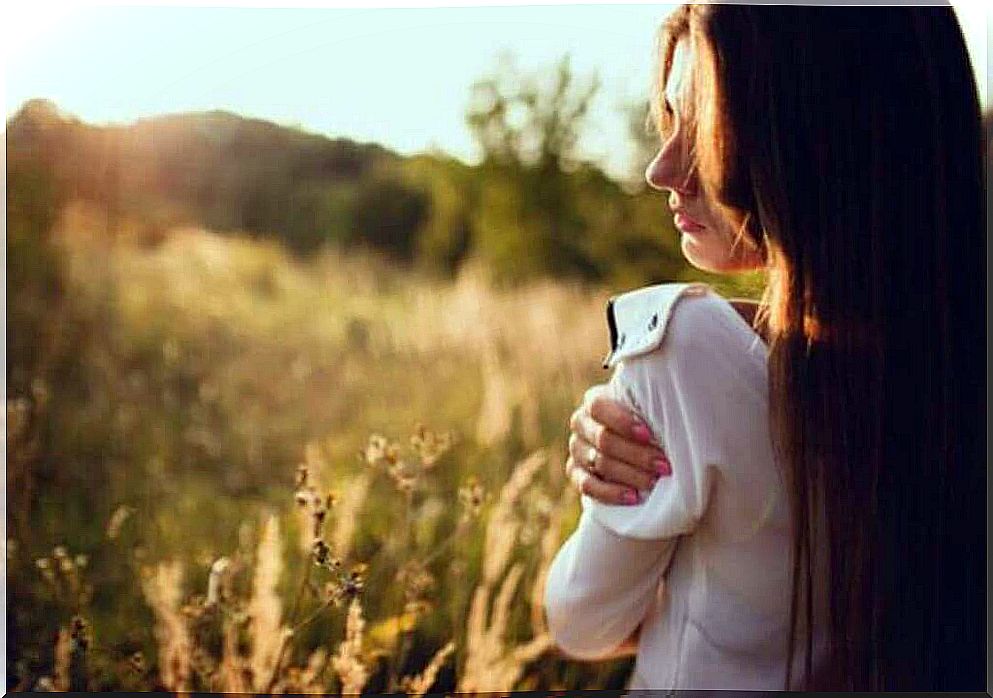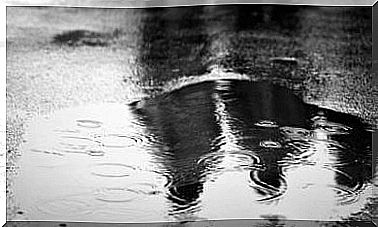Is It Love Or An Emotional Crutch?

Love and couple relationships are themes that invite us to reflect. Much has been theorized about this feeling that can be so endearing, constructive and even destructive. Depending on how it’s built or how it’s used, love can either motivate us to grow or keep us from growing. Furthermore, in a society where the ideal of romanticism prevails, it is sometimes difficult to build a healthy and fluid love relationship. In these moments, we ask ourselves: is it love or an emotional crutch?.
In more situations than we’d like, psychologists find people whose Achilles’ heel is love. They are perfectly functional in their jobs, in their family or social relationships, and in other vital areas, but they break into little pieces when they start a relationship. Why does it happen?
The experiences lived in childhood and sometimes in adolescence or early adulthood leave a deep impression. Relationships with our parents, the parenting styles we grew up with, poor self-esteem, etc., can lay the foundation that predisposes us to toxic relationships.
When a person does not acquire confidence and self-confidence in childhood, it is difficult for him to demonstrate these skills in adult life. There is a void she needs to fill somehow.
It’s not about “blaming” anyone; people are simply not perfect. As parents, we sometimes make mistakes, mostly related to a system that “forces” us to spend time away from home, to neglect issues as relevant as family, to always being stressed…
Almost without realizing it, children feel lonely. They believe that parents, their life reference, are not usually available, and that is where the idea of “abandonment” arises.

interior void
When we break a leg and have surgery, we are usually given a “prescription” for a wheelchair or a crutch. These “prostheses” help us to combat our disability and, thanks to them, we can continue to walk and live life. That is, when we physically need a prosthesis, it becomes functional until we can live normally without it.
On a psychological level and in reference to love, the same thing happens. The absence of our parents, abuse, childhood trauma, etc. lead us to develop a lack or an affective emptiness. This “hole” that remains in our soul, and that persists into adulthood, is so painful and crippling that we need to go out and find a crutch to help us. But, surprise! It’s not as effective as breaking a leg.
The result is that this relationship doesn’t work out, it becomes toxic. On the one hand, the lack we feel generates feelings of jealousy, possession or dependence, as we try to prevent this “abandonment” from happening again.
On the other hand, it is possible that our partner ends up abandoning us or treating us badly in some way, as has happened to us in the past. It’s not magic, it’s not by chance. When someone develops a mental schema, it is normal to find another schema that “complements” it. That’s why we say to ourselves: “The same thing always happens to me”, “I’m not lucky in love”.
Without being aware of it, we are re-enacting situations that we have been in for a long time. What drives us is an immense fear of being alone, of being abandoned. With every relationship we start and fail, the emptiness grows bigger. The idea of abandonment and failure in love is continually nurtured. What are we failing at?
What if I walk without the emotional crutch?
To answer this last question, we have to realize that going out in search of an emotional crutch is not the right strategy. It may be functional in the short term, but it will be a heavy burden if we project it into the future.
In a fanciful way, it can give us the feeling that it is a positive stimulus for our self-esteem, that we are finally fine, that now “everything will work out”. However, this is not how it happens. Before a relationship works out and love becomes a path without so many obstacles, it is necessary that the love we believe we need is born from us for ourselves.

We grow when we learn to hug ourselves and feel good about ourselves, with our own inner dialogue. That’s why, under these conditions, making peace with loneliness can be a great start. Force yourself to be alone time, make plans alone, tolerate boredom or emotions running through your body.
No dependencies, no disabilities, no need… Relate to someone because it adds up, because it contributes, because it’s beautiful, easy, healthy, fun; not because it is necessary. At this point, you will no longer rely on any crutch to walk; you will walk alone and this emptiness will be filled by your self-esteem.
Do you dare to love yourself unconditionally and let go of that emotional crutch?









